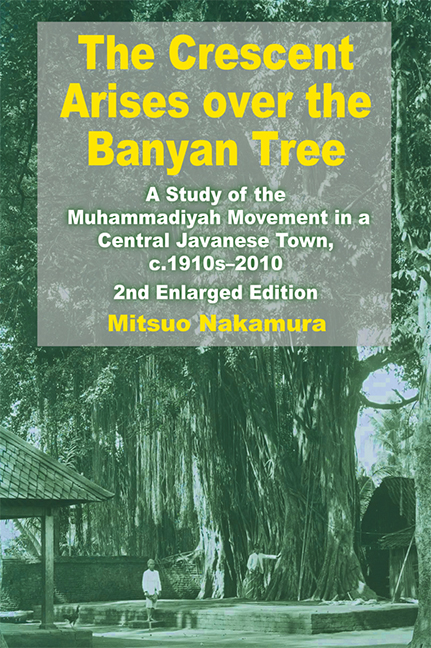 The Crescent Arises over the Banyan Tree
The Crescent Arises over the Banyan Tree Book contents
- Frontmatter
- Dedication
- Epigraph
- Contents
- List of Figures and Maps
- List of Tables
- List of Boxes
- Foreword to the Second Edition
- Preface to the Second Edition
- Foreword to the First Edition
- Preface to the First Edition
- Notes
- Map
- PART I DEVELOPMENT OF THE MUHAMMADIYAH IN KOTAGEDE, c.1910s–1972
- PART II KOTAGEDE REVISITED, 1972–2010
- Bibliography
- Glossary
- Appendices
- Index
- About the Author
Foreword to the First Edition
Published online by Cambridge University Press: 21 October 2015
- Frontmatter
- Dedication
- Epigraph
- Contents
- List of Figures and Maps
- List of Tables
- List of Boxes
- Foreword to the Second Edition
- Preface to the Second Edition
- Foreword to the First Edition
- Preface to the First Edition
- Notes
- Map
- PART I DEVELOPMENT OF THE MUHAMMADIYAH IN KOTAGEDE, c.1910s–1972
- PART II KOTAGEDE REVISITED, 1972–2010
- Bibliography
- Glossary
- Appendices
- Index
- About the Author
Summary
It is a great honour indeed for me to be requested both by Dr Mitsuo Nakamura, the author of this book, and Drs H.J. Koesoemanto, the Executive Director of Gadjah Mada University Press, to write a few lines as foreword to this book.
This book, The Crescent Arises over the Banyan Tree, A Study of the Muhammadiyah Movement in a Central Javanese Town, is originally a dissertation submitted to Cornell University, U.S.A. in 1976. The “town” is “Kotagede” in Yogyakarta. The study covers a period of approximately 70 years, from 1900 to 1970. His approach is historical and ethnological. Kotagede was chosen as his field of study due to various considerations. The development of Muhammadiyah in Kotagede presents a number of paradoxes in view of the various opinions so far presented by the Western students on the history of modern Islamic movement in Indonesia in general and of Muhammadiyah in particular.
The first paradox is that Muhammadiyah, as an organized effort to cleanse Javanese Islam from admixtures of heterodox local customs and beliefs, gained strong support in the midst of a local community where these heterodox elements had long been deeply rooted in the form of the cult of royal glorification. Strong aspirations for orthodox Islamic reform emerged from among the population, which had been thoroughly imbued with extremely syncretic religious traditions.
The second paradox is the existence of a number of rich Javanese traders and craftmen in Kotagede prior to 1900, whose wealth, entrepreneurial skills and business networks were very much impressive. It has been a common assumption among the students of modern Javanese society that, as a result of the Dutch encroachment in the field of international and domestic trade activities in Java since the day of the Dutch East Indian Company and its employment of the Chinese as middlemen between the indigenous sector and European sector of the economy, indigenous Javanese trade and industry were stifled or at least reduced to the level of petty peddling and casual handicraft (D.H. Burger, The Structural Changes in Javanese Society: The Supra-Village Sphere, Ithaca, 1956).
- Type
- Chapter
- Information
- The Crescent Arises over the Banyan TreeA Study of the Muhammadiyah Movement in a Central Javanese Town, c.1910s-2010 (Second Enlarged Edition), pp. xxxiii - xxxviiiPublisher: ISEAS–Yusof Ishak InstitutePrint publication year: 2012


